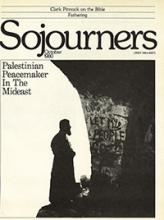When I walk down 13th or Euclid Streets carrying my son Peter in his frayed, blue backpack, he is greeted by people leaning from fourth-floor windows, by children playing in the yards, and by old men sitting on their porches. He is the only white baby boy for miles around. And I am Peter's father. Most of the people in the neighborhood don't know my name.
That is the first lesson that all parents learn: You don't make a name for yourself by just raising children. Even though children are revered, parenting isn't highly valued in our culture.
It's been almost two years since Peter's birth, and only now am I beginning to adjust to the fact that I am indeed Peter's father. I was not at all prepared for the degree of change that Peter would bring into my marriage and relationship to the community.
Even though Peter was our first child, he was not really the first "birth" experience for Jackie and me. We had both struggled with the birth and growth of Sojourners community over the past 10 years. We had known the trauma of its birth pangs, the joy of new life growing among us, the pain and uncertainty of maturing as a body of God's people. We had formed deep pastoral involvements and friendships with many people, and the church was our total life. Peter's birth and his growing demands on our time almost immediately began to conflict with our wide-ranging involvements within the community.
The full impact of becoming a parent grew much more slowly with me than with Jackie. With the decision to nurse Peter, Jackie was on call (we used to joke "on tap") every two or three hours and so could never stray very far from Peter's vicinity. She had to put him to sleep and get up in the night to feed him. Though I could bathe Peter, change him, and watch him between feedings, my time was more flexible, and I could be gone for whole days.
Read the Full Article

